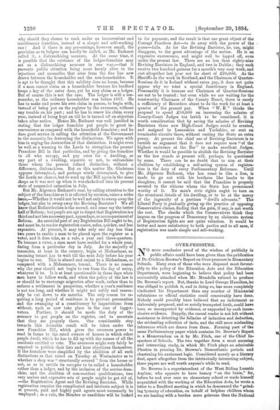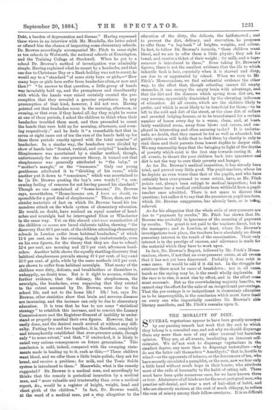OVER-PRESSITRE.
NO more conclusive proof of the wisdom of publicity in public affairs could have been given than the publication of Dr. Crichton Browne's Report on Over-pressure in Elementary Schools. Many even of those who were disposed most favour- ably to the policy of the Education Acts and the Education Department, were beginning to believe that policy had been successfully attacked when Mr. Mundella refused to produce Dr. Browne's report. But, thanks to Lord George Hamilton, he was obliged to publish it, and in doing so, has more completely vindicated his Department than any number of Ministerial refutations or official statistics could conceivably have done. Nobody could possibly have believed that an indictment so elaborately prepared, and so noisily trumpeted forth, could have been so unsupported by evidence, or supported by such incon- clusive evidence. Happily, the casual reader is not left without assistance in detecting the fallacies of induction and deduction, the misleading collection of facts, and the still more misleading inferences which are drawn from them. Forming part of the same Parliamentary paper which contains Dr. Browne's Report is a Memorandum on it by Mr. Fitch, one of the Chief In- spectors of Schools. The two together form a most amusing sod interesting study, in which Mr. Fitch plays an admirable Phorion in pruning Dr. Browne's Demosthemic periods and chastening his exuberant logic. Considered merely as a literary duel, apart altogether from the intrinsically interesting subjeet, these papers are well worth anyone's while to read.
Dr. Browne is a superintendent of the West Riding Lunatics Asylum, who appears to have lunacy "on the brain," for, before he nad ever seen an elementary school or made himself acquainted with the working of the Education Acts, he wrote a letter to a Bradford meeting in which he denounced the "grind- ing tyranny of education, on behalf of helpless children whom we are loading with a burden more grievous than the National Debt, a burden of degeneration and disease." Having expressed these views in an interview with Mr. Mundella, the latter asked or offered him the chance of inspecting some elementary schools. Dr. Browne accordingly accompanied Mr. Fitch to some eight or ten schools in Walworth, the national schools at Kennington, and the Training College at Stockwell. When he got to a school Dr. Browne's method of investigation was admirably simple. Having explained what he meant by a headache, and that one due to Christmas Day or a Bank-holiday was not to count, he would say to a" standard "of some sixty boys or girls,—" How many boys or girls here suffer from headaches often, or now and then ?" "In answer to that question, a little group of hands was invariably held up, and the promptness and simultaneity with which the hands were raised certainly created the pre- sumption that they revealed a genuine experience. In any presumption of that kind, however, I did not rest. Having pointed out that headaches occur in the morning, afternoon, or evening, or that even if they lasted all day they might be worse at one of those periods, I asked the children to think when their headaches troubled them most, and then proceeded to count the hands that wore held up for morning, afternoon, and even- ing respectively ;" and he finds it "a remarkable fact that in seven or eight cases out of ten the sum of the hands held up for these three periods exactly agreed with the total number" of headaches. In a similar way, the headaches were divided by show of hands into "frontal, vertical, and occipital" headaches. Sleeplessness was ascertained by a similar method, though, unfortunately for the over-pressure theory, it turned out that sleeplessness was generally attributed to "the baby," or "mother's mangle," or the "tramcars.?' Only one young gentleman attributed it to "thinking of his sums," while another put it down to "conscience," which was ascertained to be [is Dr. Browne quoting the boy's own words ?] "a con- suming feeling of remorse for not having passed his standard." Though no one complained of "home-lessons," Dr. Browne says, nevertheless, "Home-lessons are, I have no doubt, re- sponsible for a good deal of sleeplessness." These, then, are the slender materials of fact on which Dr. Browne based his tre- mendous attack on the whole system of elementary education. He would, no doubt, have realised an equal number of head- aches and neuralgia had he interrogated Eton or Winchester in the same way. Yet on this absurd vivd-voce examination of the children en masse are based elaborate tables, showing "the discovery that 46'1 percent. of the children attending elementary schools in London suffer from habitual headaches," of which 11'4 per cent, are in the evening, though (unfortunately, even on his own figures, for the theory that they are due to school) 12.4 per cent. are morning and 22'3 per cent, afternoon head- aches. Another table shows the equally startling discovery that habitual sleeplessness prevails among 41'4 per cent, of boys and 35'9 per cent. of girls, while by the same methods 54'2 per cent. are shown to suffer from habitual neuralgia. That many of the children were dirty, delicate, and breakfastless or dinnerless is, unhappily, no doubt true. But is it right to assume, without further evidence, that the delicacy, the sleeplessness, the neuralgia, the headaches, even supposing that they existed to the extent assumed by Dr. Browne, were due to the school life, and not to the home life ? Oh! but, says Dr. Browne, other statistics show that brain and nervous diseases are increasing, and the increase can only be due to elementary education. It is true that he has to use some "statistical strategy" to establish this increase, and to convict the Lunacy Commissioners and the Registrar-General of inability to under- stand or properly marshal their own figures. However, that is easily done, and the desired result arrived at without any diffi- culty. Putting two and two together, it is, therefore, completely and triumphantly established that over-pressure exists, though only "to some extent," and that, "if unchecked, it is likely to entail very serious consequences on future generations." This conclusion is mild, indeed, compared with the sweeping state- ments made in leading up to it, such as this,—" These children want blood, and we offer them a little brain-polish; they ask for bread, and receive a problem; for milk, and the Tonic Sol-fa system is introduced to them." Meanwhile, what is the remedy suggested? Dr. Browne is a medical man, and accordingly he thinks that the remedy is periodical inspection by a medical man, and "more valuable and trustworthy than even a medical report, &c., would be a register of height, weight, head and chest girth of the children." In fact, Dr. Browne would, at the word of a medical man, put a, stop altogether to the education of the dirty, the delicate, the half-starved ; and to prevent the dirt, delicacy, and starvation, he proposes to offer them "a log-book" of heights, weights, and colony. In fact, to follow Dr. Browne's formula, "these children want blood, and we are to offer them a little physic ; they ask for bread, and receive a ticket of their weight ; for milk, and a tape- measure is introduced to them." Even taking Dr. Browne's figures, there is not the smallest evidence that the ills to which infantile flesh is heir, especially when it is starved and dirty, are due to or aggravated by school. When we turn to Mx Fitch's Memorandum, we find substantial evidence the other way, to the effect that, though schooling cannot fill empty stomachs, it can occupy the empty brain with advantage, and. that the dirt and the diseases which spring from dirt are, we may assume, appreciably diminished by the elevating influenee of education. At all events, which are the children likely to prefer, and which is most likely to be beneficial for them,—to be left to the cold and dirt of the street, or the close dirt of cellars and crowded lodging-houses, or to be transformed for a certain number of hours every day to a warm, clean, and, at least, fairly ventilated room, away from blows and curses, and em- ployed in interesting and often amusing tasks ? It is unfortu- nate, no doubt, that they cannot be fed as well as educated, but public opinion still holds that to feed them by charity is only to sink them and their parents from lowest depths to deeper still. We may reasonably hope that the bringing to light of the deptha of poverty which exist is the first step towards curing it. At all events, to thrust the poor children back into ignorance and dirt is not the way to cure their poverty and hunger.
As for Dr. Browne's medical inspection, it has already been. tried, and proved very little good. The pupil-teachers, whose lot he depicts as even worse than that of the pupils, and who haoe certainly been over-pressed to some extent, have, as Mr. Fitch points out, always been subjert to medical inspection; but in no instance has a medical certificate been withheld from a pupil- teacher once admitted. There is not space to discuss this question; but suffice it to say that the pressure on pupil-teachers, whielt. Dr. Browne exaggerates, has already been, or is being, relieved.
As for his allegation that the whole evils of over-pressure are due to "payment by results," Mr. Fitch has shown that Dr. Browne was probably in ignorance of the meaning of payment by results. The grant is not paid to the teachers direct, but to the managers ; and in London, at least, where Dr. Browne's investigations took place, the teachers have absolutely no direst pecuniary interest in the result of the examination. Their only interest is in the prestige of success, and allowance is made for the material which they have to work upon.
In fact, Dr. Browne's Report, followed by Mr. Fitch's Memo- randum, shows, if not that no over-pressure exists, at all events that it has not yet been discovered. Probably it does exist in some cases. It would be odd if it did not. In the struggle for existence there must be cases of breakdown ; nor in all cases, harsh as the saying may be, is the result wholly deplorable. If the race is to rise, it must rise by effort, and in the effort souse must succumb. But as the overwhelming majority benefits, we cannot stay the effort for the sake of an insignificant per-centage, That the per-centage is so insignificant in elementary educa.tisa as to be imperceptible, is the conclusion which must force itself on every one who impartially considers Dr. Browne's abie literary manifesto, and Mr. Fitch's remarks upon it



































 Previous page
Previous page